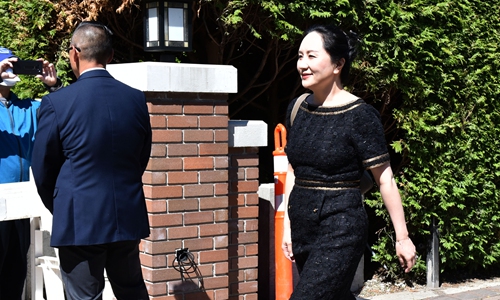No tit-for-tat retaliation doesn’t mean Ottawa off the hook over Meng case
By GT staff reporters Source:Global Times Published: 2020/6/3 20:02:54
No tit-for-tat retaliation doesn’t mean Ottawa off the hook

Huawei Chief Financial Officer Meng Wanzhou leaves her Vancouver home on May 27, 2020 to appear in British Columbia Supreme Court. Photo: AFP
Canada seems to be getting more paranoid in the aftermath of a court ruling against Huawei CFO Meng Wanzhou that sparked a new wave of indignation among Chinese public, with some in Canada wondering whether China would take retaliatory measures like more trade restrictive measures.
Chinese experts said that it's not time for tit-for-tat retaliations; however, if Canada, which has been described by Chinese officials as the US' accomplice, takes further steps on the wrong path against Chinese firms, it will certainly encounter a backlash from Beijing. The absence of immediate retaliation does not mean Ottawa is off the hook, experts said.
The Canadian business community is waiting to see if Beijing rolls out fresh punitive measures as bilateral tensions continue to mount after a Canadian court ruled against Meng in an extradition hearing on May 27, Canada's Financial Post reported.
The Canadian TV news network CTV interviewed a "former spy head" Richard Fadden, who predicted that it was possible that China could move to detain other Canadians as a result of the ruling in Meng's case.
The ruling on the so-called "double criminality" issue of Meng has overwhelmingly angered many in China, and now there are rising calls for forceful retaliation against Canada.
"The US and Canada, by abusing their bilateral extradition treaty and arbitrarily taking compulsory measures against a Chinese citizen, has gravely violated the lawful rights and interests of the said Chinese citizen," Zhao Lijian, spokesperson for China's Foreign Ministry, said on Friday.
"The purpose of the US is to bring down Huawei and other Chinese high-tech companies, and Canada has been acting in the process as an accomplice of the US," Zhao said.
Two Canadian telecom carriers - Bell and Telus - said they will not use Huawei equipment in their 5G rollout on Tuesday, according to media reports.
Despite the harsh words from Chinese officials, experts said that tit-for-tat retaliation might be unnecessary at the moment.
"Canada has closely followed the US government moves, thus it's trapped in the tug-of-war between the world's two largest economies," said Li Yong, deputy chairman of the Expert Committee of the China Association of International Trade.
"But it's not time to mix up the political incident around Meng with economic sanctions yet," Li told the Global Times on Wednesday, adding that "tensions have not gone that far."
Bai Ming, a senior research fellow at the Chinese Academy of International Trade and Economic Cooperation, agreed, saying that the case has not evolved to the stage where China rolls out more punitive measures.
As long as Meng is detained in Canada, however, her case will be a flashpoint for China-Canada relations to worsen at any time, Bai said, meaning that if the China-US conflict intensifies and Canada blindly takes the US' side, China will certainly play its cards.
Meng was arrested in Canada at the behest of the US on December 1, 2018, and since then voices have kept emerging in China calling for boycott of Canadian goods. The two nations' economic ties were hampered.
Three Canadian canola companies were suspended to export to China in March 2019. After the detection of pest contamination in their products, two biggest Canadian exporters were blocked. A third canola exporter, Richardson International, received a non-compliance notice from China over quality concerns in the following month.
The ban on Canadian canola imports, which was well-founded, was "in accordance with laws and regulations and international practice," as such imports contained harmful and dangerous pests, according to China's Foreign Ministry.
A recent survey by Canada China Business Council (CCBC) revealed that that bilateral business was markedly affected in 2019, with 43 percent reporting business was down following a record year for trade with China - Canada's second-largest trading partner after the US. The businesses in the survey said that they expected the trend to continue in 2020.
"Survey respondents were emphatic in their call for support via a clearer Canadian government strategy for China, which echoes the conclusions of our 2019 survey, where respondents felt that both governments were equally responsible for defusing bilateral tensions," said Sarah Kutulakos, executive director of the CCBC.
Data from China's Ministry of Commerce showed that in 2019, merchandise trade between China and Canada fell by 4.8 percent on a yearly basis. As a major exporter of seafood and agricultural commodities, Canada saw its exports to China decline by 16 percent year-on-year.
Newspaper headline: Canada ‘paranoid’ after Meng ruling
Posted in: INDUSTRIES,MARKETS,ON THE SPOT